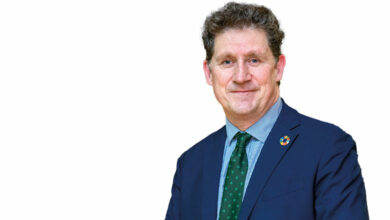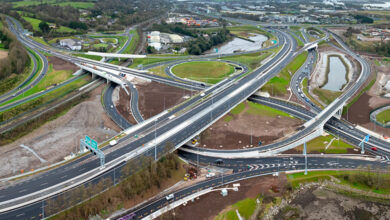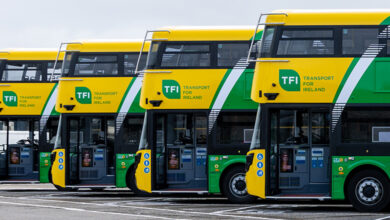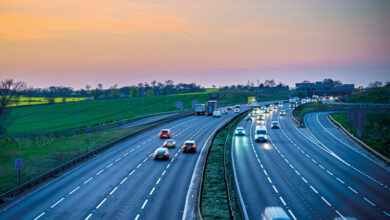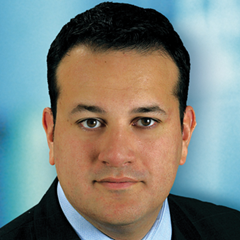 Minister for Transport Leo Varadkar answers eolas’ questions, explaining how he will work with a reduced budget, where he can innovate and his vision for airports and ports.
Minister for Transport Leo Varadkar answers eolas’ questions, explaining how he will work with a reduced budget, where he can innovate and his vision for airports and ports.
How have you found your role as Minister for Transport to date? What has been unexpected? What have you enjoyed and what were the major challenges?
As someone with a lifelong interest in politics, it was a real privilege to be asked to serve in government. The Department of Transport, Tourism and Sport is a new department with a wide remit, and a huge range of responsibilities. This makes the job very interesting, and I have enjoyed getting to grips with all of the department’s activities. I’ve been particularly impressed with the quality of the staff in the department. Even though staffing numbers are constrained, and likely to fall further, we are making real progress. Probably the biggest challenge is trying to implement policies and projects while having to reduce budgets at the same time.
What is your vision for transport’s future, particularly since you must work within severe budgetary constraints?
Maintain existing infrastructure, improve existing infrastructure and build new infrastructure that we can afford in that order. For example, roads funding has tended to focus on maintaining roads at existing standards, and when it comes to public transport the focus has been on keeping the bus fleet and rolling stock modern.
When it comes to improving existing infrastructure, the focus has been on minor improvements to existing national and regional roads like taking out dangerous bends and realigning and widening some roads.
On public transport, we are trying to improve what we have using new technology like the Leap Card and real-time passenger information displays. The number of major new projects is small but I am delighted that work will begin on improvements to the N5 at Ballaghdereen, Newlands Cross and the N11 Arklow to Rathnew projects.
I took a decision this year not to impose any more tolls on motorists, who are already dealing with rising costs. And we will finally be able to link the two Luas lines, and finish the job that should have been done years ago.
€4.36 billion will be spent on transport capital from 2012-2016. In light of this, do you see scope for innovative transport projects with minimum cost?
We are always trying to be innovative. Take the travel tax. Although we haven’t yet reached agreement with the airlines on how best to remove the travel tax, we are using some of the proceeds in the meantime to promote Ireland as a tourism destination and boost tourism.
In 2011 we re-allocated funding within the department to shovel-ready projects under the Jobs Initiative. The aim was to get people working, by developing small scale projects like refurbishing train stations or building level crossings. These projects make a real difference to people’s lives.
What are the expected benefits of the Luas BXD line? Have you any preferences for allocation of the estimated €16 million that will be provided annually until 2016 for public transport projects in the regional cities?
Luas BXD will finish the job that should have been completed years ago. It will open up a host of new routes across Dublin, and further afield, by linking the two Luas lines and also providing a spur to the Maynooth line. For the first time it will be possible to get from Leixlip to Dundrum, or St Stephen’s Green to the O2, with just one change. It is expected to add 10 million more passengers to the Luas system. Unlike most railways, Luas operates at a surplus most years. As for the regional cities, I’m in discussions with the National Transport Authority on this and expect to have progress soon.
Privatisation and restructuring have been mooted for the state-owned airports and ports. By the time you leave office, how would you like Ireland’s airports and ports to have developed?
Our priority for the airports and ports is to ensure that there is greater competition and that three state airports become financially viable in their own right. The Government is currently examining the best ownership and management structure for the three state airports. I commissioned Booz & Co to consult widely on this matter last year, which will inform government policy. I hope to have a ports policy review concluded in the near future but we have already acted in a number of cases, such as merging Dundalk port with Dublin, and reverting the management of several harbours back into their local authority.
The value for money audit carried out for the comprehensive review of public expenditure recommends ‘improved coherence’ between the Rural Transport Programme, licensed services and Bus Éireann Services. How do see transport evolving in rural areas such as Donegal?
That’s an area which is being considered by my colleague in the department, Minister of State Alan Kelly, and I expect him to report on the matter in the near future. However, it does make sense to ensure that existing services are interconnected, particularly in rural areas. There are very good examples in Donegal of integrating local, rural, school and HSE transport while keeping costs down.
The Government’s road safety target of achieving no more than 252 deaths per annum by the end of 2012 was achieved three years ahead of schedule. What are future plans to further improve on this progress?
Real progress has been made in the area of road safety, and much of the credit must go to the previous ministers who laid the groundwork. This Government made road safety a priority from day one, as the Road Traffic Act 2011 was the first piece of legislation before the Dáil. In the year ahead I intend to have legislation drafted to provide for preliminary roadside drug testing. The Dáil will shortly debate new laws on roadworthiness testing for commercial vehicles and the introduction of the plastic card drivers’ licence.
How is your department contributing to the public sector reform agenda?
This is a high priority for me personally, as well as for the department. In legislative terms, we have moved to a situation whereby bills are routinely drafted in co-operation with the relevant Oireachtas committee. They go to the committee at ‘heads of bill’ or ideas stage before the bill is drafted. This has ended the sort of ‘rubber-stamping’ which the Dáil had been reduced to before the last election, and gives TDs of every party an opportunity to contribute to legislation. I was also the first Minister to advertise vacancies on state boards, a process which is now government policy, and to require chairpersons-designate to appear for questioning by the Oireachtas committee prior to appointment.
At official level, we are getting staff numbers down and making more effective use of IT. The department is ahead of the curve when it comes to things like online processing of parliamentary questions and Ministerial submissions.
Please outline your three main priorities for 2012.
It’s hard to pick three priorities for the year ahead. But three good examples from right across the department would be continue to improve road safety, put in place all the foundations need to make a real success of the Gathering 2013 ‘festival of festivals’, and launch a new round of sports capital funding.
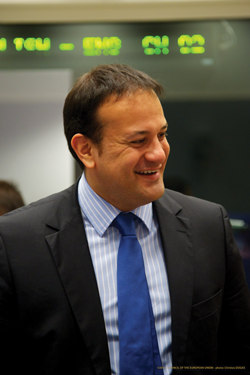 Personal profile: Leo Varadkar
Personal profile: Leo Varadkar
How do you like to spend your spare time?
I guess I don’t have much spare time but I like to take some out to watch TV, catch a movie or go out for dinner with friends or family. I try to get some exercise several times a week either in the gym or running in the Phoenix Park near where I live. It clears the mind and is the only time I escape from my Blackberry.
Name one person who has had an impact on your political career and why?
I know it sounds sycophantic, but probably Enda Kenny. He promoted me to the front bench within a few months of being elected to the Dáil and then to Cabinet. He is has put a huge amount of faith in me and I owe him a lot. We are very different people and come from very different places so I think there is a lot I can learn from him.
Please describe two of your favourite books.
‘Midnight’s Children’ by Salman Rushdie. I read this in Mumbai while I was there as a medical student. Mumbai is the city that my father grew up in, and I still have family there. The book is set in the city and it was amazing to read it while I was there.
I really like political biographies. It was fascinating to read the biographies of Tony Blair, Peter Mandelson and Alastair Campbell and to compare their different versions of events.
Is there anything about you that may surprise people?
Most people are surprised that I am tall. Every day someone tells me that.

